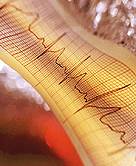
WEDNESDAY, Sept. 22 (HealthDay News) — Young people with the kind of irregular heartbeat known as atrial fibrillation may be better off undergoing surgery to fix the problem instead of taking medication first, a new study suggests.
Atrial fibrillation, which causes a person’s pulse rate to change from minute to minute, can boost the risk of stroke and cause other problems. The condition is rare in younger people and can occur for no known reason.
There are a number of treatments for atrial fibrillation, including medication, cardioversion (in which a doctor shocks the heart to try to restore it to a normal rhythm) and catheter ablation (a surgery that destroys the tissue in the heart that causes the problem).
A heart specialist who’s familiar with the new study findings said ablation is indeed a worthwhile alternative. “Younger patients tend to respond very well to this therapy,” said Dr. John Day, medical director of heart rhythm services at Intermountain Medical Center in Murray, Utah.
In the study, which was released online Sept. 21 in advance of publication in the journal Circulation: Arrhythmia & Electrophysiology, researchers examined the medical records of 1,548 patients who underwent catheter ablation between 2000 and 2008 in the University of Pennsylvania Health System. The average age of the patients was 56 years, and 70 percent were men.
The investigators found that younger patients had fewer complications than older ones and did just as well after the surgery. A year after surgery, 87 percent of the patients under the age of 45 had experienced little or no atrial fibrillation.
Why choose the surgery instead of medication? “While atrial fibrillation is more common with increasing age, clinical experience has suggested that younger patients tend to be more symptomatic and less willing to take long-term medications,” Dr. Peter Leong-Sit, study lead author and an arrhythmia physician at London Health Sciences-University Hospital in London, Ontario, Canada, said in a news release from the American Heart Association.
The surgery isn’t cheap. It can cost $30,000-$40,000, Day noted. But studies have shown it can be cheaper in the long run if the alternative is a lifetime of medications and complicated testing and care, he added.
More information
For more about atrial fibrillation, visit the U.S. National Library of Medicine.

